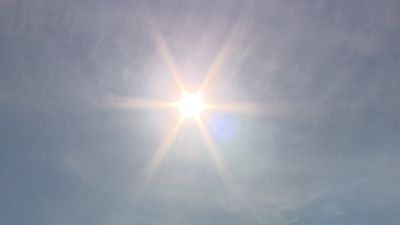Could the UK temperature record of 38.7°C set in Cambridge be broken in this week's heatwave?

Watch a report on the effects of heatwave in the East of England by ITV News Anglia's Claire McGlasson
The UK Health Security Agency has issued a heat health alert for the UK and the East of England with temperatures set to soar above 35°C.
The UK record highest temperature was set in July 2019 when it reached 38.7°C at the weather station in the Cambridge Botanic Garden. There is a one in three chance that record could be broken in the next few days.
A level three Heat Health Alert has been issued by the Met Office and the UK Health Security Agency (UKHSA) from 9am on Monday to 9am on Friday in the east and south-east of England, with the rest of the nation having a level two alert in place.
The four-level system highlights the potential health impacts of these high temperatures. Councils are advising people to take precautions amid the soaring temperatures.
Extreme heat warning issued
In addition, the Met Office has issued an amber warning of "extreme heat" for Sunday 17 July across a large part of the UK .
It is being enforced across the east Midlands, east of England, London, south east, north east, north west, south west, wales, west Midlands and Yorkshire and Humber.
A statement from the Met Office said: "Population-wide adverse health effects are likely to be experienced, not limited to those most vulnerable to extreme heat, leading to potential serious illness or danger to life."
The amber heat warning says: "Substantial changes in working practices and daily routines are likely to be required.
"Significantly more people are likely to visit coastal areas, lakes and rivers leading to increased risk of water safety incidents.
"Delays on roads and road closures are possible, along with delays and cancellations to rail and air travel, with potential for significant welfare issues for those who experience even moderate delays."
Experts have warned that the UK needs to urgently adapt to a future with more heatwaves, adding that hot spells have a greater potential impact than other climate extremes such as flooding.
Weather forecasting computer models suggest it is possible - though not likely - temperatures could reach 40°C in the UK next weekend. However a spokeswoman for the Met Office said it takes computer modelling into consideration when making its predictions and it believes the warmest weather will not reach 40°C.
However temperatures are still expected to soar this week - ahead of that further blast of hot weather over the weekend. The Met Office said highs of 33°C are expected in some areas on Monday afternoon, with central, southern and eastern England all experiencing the rising temperatures during the heatwave.
Monday could mark the hottest day of the year so far, with the UK's highest temperature for this year so far currently standing at 32.7°C. It was recorded at Santon Downham on the Suffolk-Norfolk border and at Heathrow airport on 17 June.
The heat is combined with extremely dry conditions across the East. The first half of the year has seen only two-thirds of the normal rainfall in East Anglia and it was the driest January to June period for more than a quarter of a century. There have been only ten other drier six-month periods in East Anglia since rainfall records started in the region in 1836.
The Local Government Association (LGA), which represents councils in England and Wales, has encouraged people to enjoy the sun safely and to check up on those who may be more vulnerable, including the elderly and those with heart and respiratory problems.
Water companies, meanwhile, are urging people not to waste water during the heatwave this week. Suppliers have said that higher demand and irresponsible use during hot weather spells can lead to people not having any water running through their taps.
The suppliers say it is not due to a shortage, but to do with companies not being able to treat water quickly enough to keep up with the demand. They have urged people to find alternatives to cooling down rather than having cold showers, including taking a dip in a local swimming pool or the sea.
Met Office forecaster Greg Dewhurst said that England and Wales will experience sunshine on Monday, while Scotland and Northern Ireland are expected to have a cloudy day with warm temperatures.
"For most of us it will be a dry and sunny day, well into the high 20s from the morning, with central, southern and eastern parts of England to possibly see maximum highs of 33°C," he said. "It will also be very warm overnight going into Tuesday, remaining in the low 20s in cities, so many may experience an uncomfortable night."
Highest temperatures by 4pm on Monday 11 July in the East of England
31.4°C in Cambridge
31.2°C in Santon Downham, Suffolk
31.1°C in Sawtry, Cambridgeshire
31.1°C in Writtle, Essex
30.9°C in Wittering, Cambridgeshire
30.9°C in Woburn, Bedfordshire
30.6°C in Marham, Norfolk
What is a heatwave?
The Met Office defines a heatwave as a period of three or more days when a threshold temperatures in reached. That threshold is different depending on where you live.
For Norfolk, Northamptonshire, Suffolk and Essex the heatwave trigger temperature is 27°C while in Cambridgeshire, Hertfordshire and Bedfordshire the temperature needs to reach 28°C for three consecutive days.
ITV News Anglia meteorologist Aisling Creevey explains what triggers a heatwave in the UK